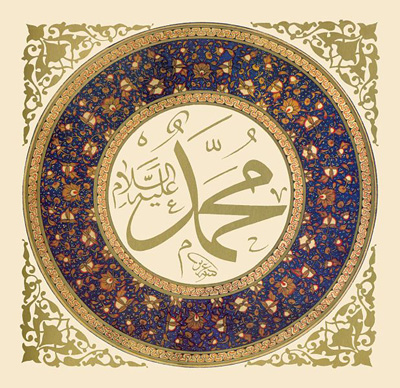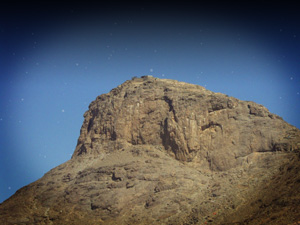Who was Muhammad?
 The orphan
The orphan
Muhammad was born in 570 in Mecca, modern day Saudi Arabia, to a single mother whose husband died before she gave birth. Muhammad was of noble blood, and it was the custom for those children of higher social standing to have a wet nurse. A Bedouin woman named Halima cared for him, and took him into the harsh desert to live with her people. For such a young child it was a challenging environment. But it was here that Muhammad would develop his first close connection with nature, and spend most of his time in solitude contemplating the world around him.
He returned to his mother, Amina, who took him to visit his father’s grave, but on the return journey she fell dangerously ill. Muhammad was barely six years old when he faced the loss of another parent. Later his own experience would help him to encourage compassion for orphans, telling his companions that kindness shown to parentless children would grant them Paradise.
The shepherd and the businessman
Muhammad went to live with his grandfather Abdul Muttalib, and spent two happy years with him, until he died when Muhammad was eight years old. Again he had to face emotional and physical upheaval, moving to live with his uncle Abu Talib. As a young boy, Muhammad earned his living as a shepherd, a role he was later to speak about with fondness: “All the prophets of God were shepherds”. Later he would become renowned for his honest dealing with people in business and trade.
The husband
A wealthy businesswoman named Khadijah requested Muhammad’s expertise in negotiating a business venture for her. When she heard of how he secured more than she expected, she was impressed and made enquiries about his character. On hearing the accounts of his generous and noble nature, she sent a proposal to the 25 year old man. Khadijah was a widow some fifteen years older than Muhammad, and had children from two previous marriages; she was intelligent, independent and kind. Muhammad accepted her offer. Khadijah and Muhammad’s marriage was a happy and harmonious one: they consulted, supported and cared for each other in equal measure. She was his first love, the first he turned to for support, and the first to acknowledge his prophethood. They had four daughters together who they cherished, and two sons, but they tragically both died in infancy.
The Revelation
Muhammad had always treated those around him with honour, kindness and respect. Yet he was troubled. Troubled by the injustices he saw around him of backward tribal practices – of female infanticide, of oppression of the vulnerable and of inequality. He had distanced himself from ignorance, superstition and the practice of idol worship. He often retreated to a cave on the mountain of Hira to reflect, wondering what he could do to change such deep-rooted customs.  It was now 610, Muhammad was only aged forty but at a point in his life where he had already faced great sorrows: losing both his parents at an early age, his grandfather and two young sons. One night, when he again went to the secluded cave to be alone with his thoughts, he encountered an experience that would dramatically change his life, his society and the wider world.
It was now 610, Muhammad was only aged forty but at a point in his life where he had already faced great sorrows: losing both his parents at an early age, his grandfather and two young sons. One night, when he again went to the secluded cave to be alone with his thoughts, he encountered an experience that would dramatically change his life, his society and the wider world.
“Read!” a voice called out him. It was the angel Gabriel. Muhammad was frightened but responded he could not read – indeed he did not know how to read or write. Again Gabriel commanded him to read, and a third time said “Read! In the name of your Sustainer. He who taught man by the pen that which he did not know.” Following this divine visitation, Muhammad went immediately to the only person he could relate what had happened and find solace in: his wife. He was shaking violently from the experience; Khadijah wrapped him in a covering and comforted him. This was the first of many revelations that would come to him over a period of twenty three years.
